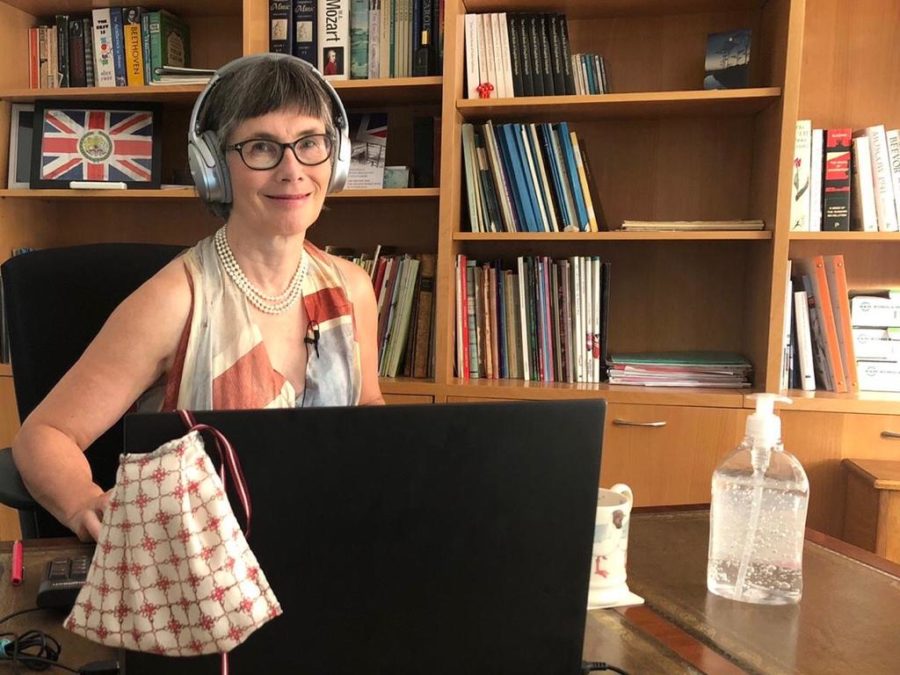21st September 2020 Belgrade, Serbia
The Online Diplomat

I was recently asked to open a conference on communications. Because of the public health situation the conference was held virtually, that is to say, online.
It’s a dangerous thing to be an amateur opening a conference of professionals.
To do so using their own medium was, to use typically British irony, ‘courageous’.
I realised that I was probably in more need of advice from the experts than they were from me. But as the saying goes, nothing ventured, nothing gained.
Diplomacy, broadly speaking is about policy, people and places. A diplomat’s life and work is about presenting policy, meeting people and visiting places.
That’s tricky just now.
I wouldn’t go as far as a well-known commentator for Carnegie Europe who said that coronavirus had “brought diplomatic activity to a standstill”.
But there is a quite a lot of what we normally do that we can’t do or have to do differently. We may even discover that some things that we have been doing for years we don’t really need to do at all now.
Diplomacy used to be conducted behind closed doors. Diplomats and their profession had a certain status and mystique. As I child at a small village school I might have been able to find a definition of a diplomat in a dictionary, but nothing more. Now I can find the whole world of diplomacy online.
The online world offers diplomats many tempting opportunities and we are still learning how to use them productively. Like other professions we have probably spent too much time over the past 8 months using our newly acquired capability to hold global meetings at the drop of a diplomatic hat.
Let me present two condundrums.
Example One
The British Foreign Secretary has 258,000 followers on Twitter.
The Foreign Office Cat, Palmerston @diplomog, has 112,000 followers on Twitter. So, not as many as the Foreign Secretary – but more than many Government ministers and any British ambassador.
But you can’t really ask a cat to tweet about international negotiations or nuclear policy, can you?
Example Two
I am an experienced diplomat. I can write carefully argued foreign policy advice and polished analysis. My job is to represent my country, not to promote my own personality
But I get more attention on social media if I play a musical instrument or post a picture of my bicycle than if I write about arms control treaties.
The online world presents many challenges for diplomats – and not just the risk of getting it wrong and causing embarrassment with a badly judged post.
Social media favours the brief, the ephemeral and the superficial. It prefers the entertaining over the serious. There is a careful balance to be struck between the entertaining and the serious when you are an official representative of your country.
In normal times that’s OK. I love the fun stuff, the colourful stuff and the funny stuff that presents a different, more human side of diplomats and diplomacy. It lets us talk to a wider audience.
And, I should mention that, for British diplomats in particular, social media gives us additional opportunities to pursue our national pastime of commenting on the weather.
But our primary purpose is not to entertain or to indulge our endemic enthusiasm for meteorology. Sometimes we need more than an Instagram snap or 140 characters to talk about serious and important issues. Sometimes, too, 140 characters may be enough for an important topic – but your audience doesn’t find it as interesting as your photo of a beautiful sunset.
The real challenge now is how to be really effective when most of your diplomacy is ‘online’.
How should you be a diplomat when you are doing most of your meetings over video links?
When you can’t hold big events to bring people together at your Embassy?
When you can’t travel around your host country
There is good digital diplomacy and there is bad digital diplomacy, that’s to say the thankfully rare times when diplomats get it wrong and undermine policies or damage relationships.
In the middle there is a lot of stuff that we, as diplomats, post that is not really good nor bad, but that is probably only ‘liked’ by other diplomats – or the people in our pictures.
You know what I mean: A picture of a meeting that has a caption saying: ‘Great meeting.’
As a diplomat I can use digital media to interact with people; I can use it to inform and to entertain; and, of course, all diplomats want to have a positive influence on what people think about their country.
We are still all exploring how best to work offline and online in a coronavirus world. To put it simply, as an online diplomat I want to:
- make decision makers understand UK policies and views;
- promote things that are important to us, like environmental protection and media freedom;
- tell a wider audience about my country; and
- create a positive impression of the
In a coronavirus world it is more important that ever than I am using right tools, creating the right content – and have the right digital and communication skills.
This podcast – or blogcast – is a bit of an experiment. I’m not aware of any other ambassadors that record blogcasts, and there may be a good reason for that.
So please listen in for the next few weeks and let me know what you think, and what you would like to know about diplomats and diplomacy.
My Twitter handle is @SianCMacLeod and my Embassy is is @UKinSerbia. When I remember to, I use the hashtag: KakoBitiDiplomata.
We have posted links to this blogcast. Please follow us and let us know what you think and what would like to know about diplomacy.